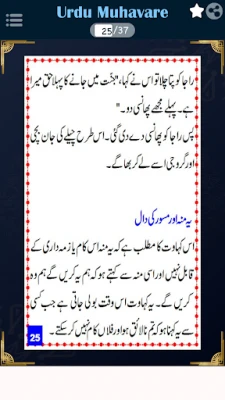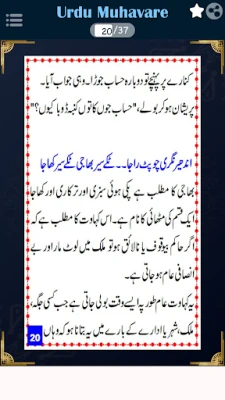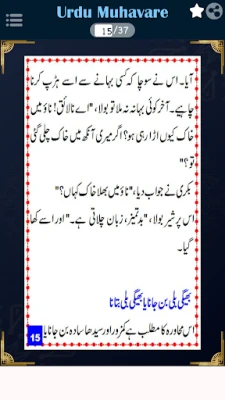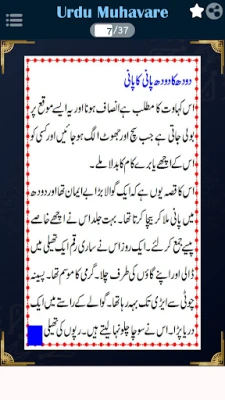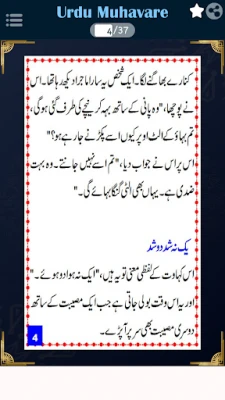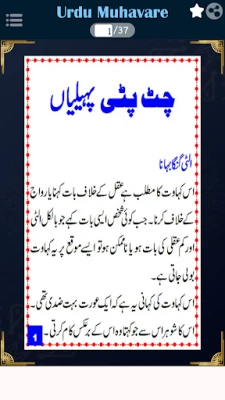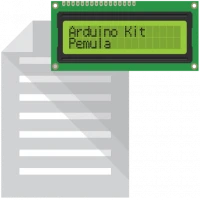
Latest Version
Version
1.0
1.0
Update
November 27, 2024
November 27, 2024
Developer
Pak Appz
Pak Appz
Categories
Education
Education
Platforms
Android
Android
Downloads
0
0
License
Free
Free
Package Name
com.PakApps.UrduMuhavare
com.PakApps.UrduMuhavare
Report
Report a Problem
Report a Problem
More About Urdu Muhavare aur Kahanyian
دنیا میں بولی جانے والی ہر زبان میں کچھ ایسے جملے یا الفاظ ضروررائج ہوتےہیں ،جن کا استعمال گفتگو یا تحریر میں نہ صرف دل چسپی پیدا کرتا ہے، بلکہ مقصدِ بیان بھی واضح کردیتا ہے۔ اُردو زبان میں ایسے جملوں کو ’’محاورے ‘‘ کہا جاتا ہے۔ اہلِ زبان کے مطابق محاورے دو یا دو سے زیادہ الفاظ کا ایسا مجموعہ ہے، جو اپنے حقیقی یا لغوی معنی کے برعکس اصلاحی یا تمثیلی معنی میں استعمال ہو۔
محاوروں کا خالق کون ہے اور یہ کیسے وجود میں آئے، اس کا حتمی اندازہ لگانا، تو ممکن نہیں، مگریہ کہا جاسکتا ہے کہ ان کے پیچھے کوئی تجربہ، مشاہدہ یا دل چسپ کہانی ضرور پوشیدہ ہوتی ہےاور ان کہانیوں میں دانائی کا کوئی ایسا پہلو ضرور ملتا ہے، جو رہنمائی و اصلاح کا سبب بنتا ہے۔ محاوروں کی ایک اور خوبی یہ بھی ہے کہ یہ زبان زدِعام ہوتے ہیں اوراہلِ علم کے علاوہ عام لوگ بھی ان سے بخوبی واقف ہوتے ہیں۔ اُردو زبان میں رائج محاورے دل چسپ ہونے کے ساتھ نصیحت آموز بھی ہیں۔ان میں سے کچھ محاوروںکے پیچھے پوشیدہ کہانیاںزیرِ نظر مضمون میں پیش کی جارہی ہیں۔
Idioms and proverbs are those phrases that don’t give literal meaning, but they point to a moral lesson. This lesson will teach the most commonly used Urdu proverbs (Urdu Muhavare) with English translation. It’s essential to know the widely used proverbs because they will let you speak more professionally and mature your language.
Urdu Muhavare Kahawatain/ Proverbs in Urdu: Urdu Proverbs with their meanings are very sweet and beautiful language being spoken in Pakistan and India. Even you can find Urdu speakers across the World
Common Urdu Proverbs List
In the Urdu culture, there is a saying for each situation that can advise adults and older individuals. These sum up the knowledge of wisdom gained overages. The proverbs in Urdu are known as کہاوت (kahawat). There are countless Urdu idioms. You can learn the Roman Urdu version of each proverb with the English translation.
Here are some!
اسکی عقل چرنے کو گئی ہے
Romanized Urdu: Iski aqal ghas charnay ko gai hai.
Literal translation: His mind has gone to graze.
Contextual Meaning: It implies something like he has lost his mind. This proverb has an English equivalent i.e his wits are gone a wool-gathering.
انگور کھٹے ہیں
Romanized Urdu: angur khatte hain
Literal translation: Grapes are sour.
Contextual Meaning: This proverb is used when an individual cannot attain something so they pretend like getting it will not do any benefit anyway and they did not need it in the first place.
انتھ بھلا تو سب بھلا
Romanized Urdu: ant bhala to sab bhala
Literal translation: All is well that ends well
Contextual Meaning: It means all’s well the end’s well. It means that if the ending is good enough then everything that has happened earlier (e.g emergencies be it good or bad) is good.
اونچی دوکان پھیکا پکوان
Urdu proverbs
Romanized Urdu: Onchi dukan pheeka pakwan
Literal translation: Tall shop tasteless sweet
Contextual Meaning: It implies that great cry little wool. It is used when something looks splendid but when it is tested it does not yield much profit like a business.
اب پچھتائے کیا، جب چڑیاں چگ گئیں کھیت
Romanized Urdu: ab bachtain kya jab chirian chug gayi khait
Literal translation: Why regret now when birds ate the crop
Contextual Meaning: It implies there is no use crying over spilled milk. In other words, this means that when there was time to work on something, the person wasted all the time and now that the time’s up, the person is regretting why they did not make enough effort which is useless.
اوس چاٹنے سے پیاس نہیں بجھتی
Romanized Urdu: Aos chatne se pyas nei bhujti
Literal translation: Licking dewdrops won’t clench your thirst
Contextual Meaning: It implies A fog cannot be dispelled by a fan. It is used to indicate that some things are irreplaceable and you cannot use the other thing to overcome the need of having the first thing.
اونٹ کے منہ میں زیرا
Urdu proverbs
Romanized Urdu: Onth ke moun mein zeera
Literal translation: Cumin in camel‘s mouth.
Contextual Meaning: It implies that something is too little for a very big thing.
Idioms and proverbs are those phrases that don’t give literal meaning, but they point to a moral lesson. This lesson will teach the most commonly used Urdu proverbs (Urdu Muhavare) with English translation. It’s essential to know the widely used proverbs because they will let you speak more professionally and mature your language.
Urdu Muhavare Kahawatain/ Proverbs in Urdu: Urdu Proverbs with their meanings are very sweet and beautiful language being spoken in Pakistan and India. Even you can find Urdu speakers across the World
Common Urdu Proverbs List
In the Urdu culture, there is a saying for each situation that can advise adults and older individuals. These sum up the knowledge of wisdom gained overages. The proverbs in Urdu are known as کہاوت (kahawat). There are countless Urdu idioms. You can learn the Roman Urdu version of each proverb with the English translation.
Here are some!
اسکی عقل چرنے کو گئی ہے
Romanized Urdu: Iski aqal ghas charnay ko gai hai.
Literal translation: His mind has gone to graze.
Contextual Meaning: It implies something like he has lost his mind. This proverb has an English equivalent i.e his wits are gone a wool-gathering.
انگور کھٹے ہیں
Romanized Urdu: angur khatte hain
Literal translation: Grapes are sour.
Contextual Meaning: This proverb is used when an individual cannot attain something so they pretend like getting it will not do any benefit anyway and they did not need it in the first place.
انتھ بھلا تو سب بھلا
Romanized Urdu: ant bhala to sab bhala
Literal translation: All is well that ends well
Contextual Meaning: It means all’s well the end’s well. It means that if the ending is good enough then everything that has happened earlier (e.g emergencies be it good or bad) is good.
اونچی دوکان پھیکا پکوان
Urdu proverbs
Romanized Urdu: Onchi dukan pheeka pakwan
Literal translation: Tall shop tasteless sweet
Contextual Meaning: It implies that great cry little wool. It is used when something looks splendid but when it is tested it does not yield much profit like a business.
اب پچھتائے کیا، جب چڑیاں چگ گئیں کھیت
Romanized Urdu: ab bachtain kya jab chirian chug gayi khait
Literal translation: Why regret now when birds ate the crop
Contextual Meaning: It implies there is no use crying over spilled milk. In other words, this means that when there was time to work on something, the person wasted all the time and now that the time’s up, the person is regretting why they did not make enough effort which is useless.
اوس چاٹنے سے پیاس نہیں بجھتی
Romanized Urdu: Aos chatne se pyas nei bhujti
Literal translation: Licking dewdrops won’t clench your thirst
Contextual Meaning: It implies A fog cannot be dispelled by a fan. It is used to indicate that some things are irreplaceable and you cannot use the other thing to overcome the need of having the first thing.
اونٹ کے منہ میں زیرا
Urdu proverbs
Romanized Urdu: Onth ke moun mein zeera
Literal translation: Cumin in camel‘s mouth.
Contextual Meaning: It implies that something is too little for a very big thing.
Rate the App
Add Comment & Review
User Reviews
Based on 0 reviews
No reviews added yet.
Comments will not be approved to be posted if they are SPAM, abusive, off-topic, use profanity, contain a personal attack, or promote hate of any kind.
More »










Popular Apps

Santander Inversiones Uruguay 5Banco Santander Uruguay

Santander Empresas Portugal 5Banco Santander Totta S.A.

Mi Tarjeta SantanderBanco Santander Uruguay

Santander Empresas ARBanco Santander (Argentina)

Santander ArgentinaBanco Santander (Argentina)

Santander EmpresasBanco Santander (Brasil) S.A.

SantanderSignSantander Consumer Bank AG (Deutschland)

Santander mobileSantander Bank Polska S.A.

Santander InternationalSantander International

UFCU Mobile 5UFCU
More »










Editor's Choice

Grim Soul: Dark Survival RPG 5Brickworks Games Ltd

Craft of Survival - Gladiators 5101XP LIMITED

Last Shelter: Survival 5Long Tech Network Limited

Dawn of Zombies: Survival GameRoyal Ark

Merge Survival : Wasteland 5StickyHands Inc.

AoD Vikings: Valhalla Game 5RoboBot Studio

Viking Clan: Ragnarok 5Kano Games

Vikings: War of Clans 5Plarium LLC

Asphalt 9: Legends 5Gameloft SE

Modern Tanks: War Tank Games 5XDEVS LTD

